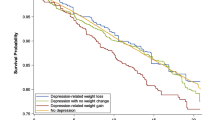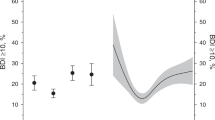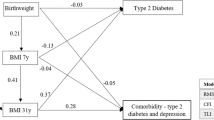Abstract
Objective:
Although it has been hypothesized that the depression–obesity relation is bidirectional, few studies have addressed this hypothesis in a prospective setting. We aimed to examine the bidirectional relationship in middle-aged and elderly women.
Subjects:
A total of 65 955 women aged 54–79 years in the Nurses’ Health Study were prospectively followed from 1996 to 2006 with updated information on body weight, depression status and various covariates every 2 years. Depression was defined as self-report of physician-diagnosed depression and/or antidepressant use. Obesity was defined as a BMI ⩾30.0 kg m−2. The first three waves (1996–2000) were used as the baseline period and the last three waves (2002–2006) were used as the follow-up period.
Results:
After adjusting for baseline age, physical activity, comorbidities, BMI and other covariates, depression at the baseline period was associated with an increased risk of obesity at the follow-up period in all women (multivariate-adjusted odds ratio (OR), 1.38; 95% confidence interval (95% CI), 1.24–1.53) and baseline non-obese women (OR, 1.51; 95% CI, 1.36–1.67). In the opposite direction, after adjusting for baseline age, physical activity, comorbidities, depression status and other covariates, obese women at baseline had a moderately increased risk of depression at the follow-up period compared with normal-weight women (OR, 1.11; 95% CI, 1.03–1.18), and this association was similar for new onset of depression (OR for obese versus normal weight women, 1.10; 95% CI, 1.02–1.20).
Conclusions:
Our results suggest a bidirectional association between depression and obesity in middle-aged and elderly women. Future studies are needed to confirm our findings in different populations, and investigate the potential mechanisms underlying this association. Our results underscore the importance of early detection and proper behavioral modifications to lower the burden of both conditions.
This is a preview of subscription content, access via your institution
Access options
Subscribe to this journal
Receive 12 print issues and online access
$259.00 per year
only $21.58 per issue
Buy this article
- Purchase on Springer Link
- Instant access to full article PDF
Prices may be subject to local taxes which are calculated during checkout
Similar content being viewed by others
References
World Health Organization. Obesity and overweight. WHO Fact Sheet No 311. Available from: http://www.who.int/mediacentre/factsheets/fs311/en/. Accessed March 9, 2011.
Mathers CD, Loncar D . Projections of global mortality and burden of disease from 2002 to 2030. PLoS Med 2006; 3: e442.
Kessler RC, Berglund P, Demler O, Jin R, Koretz D, Merikangas KR et al. The epidemiology of major depressive disorder: results from the National Comorbidity Survey Replication (NCS-R). JAMA 2003; 289: 3095–3105.
Olfson M, Marcus SC . National patterns in antidepressant medication treatment. Arch Gen Psychiatry 2009; 66: 848–856.
Cherry DK, Woodwell DA, Rechtsteiner EA . National Ambulatory Medical Care Survey: 2005 summary. Advance Data 2007; 387: 1–39.
Middleton K, Hing E, Xu J . National Hospital Ambulatory Medical Care Survey: 2005 outpatient department summary. Advance Data 2007; 389: 1–34.
Mezuk B, Eaton WW, Albrecht S, Golden SH . Depression and type 2 diabetes over the lifespan: a meta-analysis. Diabetes Care 2008; 31: 2383–2390.
Hu FB, Manson JE, Stampfer MJ, Colditz G, Liu S, Solomon CG et al. Diet, lifestyle, and the risk of type 2 diabetes mellitus in women. N Engl J Med 2001; 345: 790–797.
Van der Kooy K, van Hout H, Marwijk H, Marten H, Stehouwer C, Beekman A . Depression and the risk for cardiovascular diseases: systematic review and meta analysis. Int J Geriatr Psychiatry 2007; 22: 613–626.
Bogers RP, Bemelmans WJ, Hoogenveen RT, Boshuizen HC, Woodward M, Knekt P et al. Association of overweight with increased risk of coronary heart disease partly independent of blood pressure and cholesterol levels: a meta-analysis of 21 cohort studies including more than 300 000 persons. Arch Intern Med 2007; 167: 1720–1728.
Cuijpers P, Smit F . Excess mortality in depression: a meta-analysis of community studies. J Affect Disord 2002; 72: 227–236.
Flegal KM, Graubard BI, Williamson DF, Gail MH . Excess deaths associated with underweight, overweight, and obesity. JAMA 2005; 293: 1861–1867.
Atlantis E, Baker M . Obesity effects on depression: systematic review of epidemiological studies. Int J Obes (Lond) 2008; 32: 881–891.
de Wit L, Luppino F, van Straten A, Penninx B, Zitman F, Cuijpers P . Depression and obesity: a meta-analysis of community-based studies. Psychiatry Res 2010; 178: 230–235.
Luppino FS, de Wit LM, Bouvy PF, Stijnen T, Cuijpers P, Penninx BW et al. Overweight, obesity, and depression: a systematic review and meta-analysis of longitudinal studies. Arch Gen Psychiatry 2010; 67: 220–229.
Roberts RE, Deleger S, Strawbridge WJ, Kaplan GA . Prospective association between obesity and depression: evidence from the Alameda County Study. Int J Obes Relat Metab Disord 2003; 27: 514–521.
Kivimaki M, Lawlor DA, Singh-Manoux A, Batty GD, Ferrie JE, Shipley MJ et al. Common mental disorder and obesity: insight from four repeat measures over 19 years: prospective Whitehall II cohort study. BMJ 2009; 339: b3765.
Pan A, Lucas M, Sun Q, van Dam RM, Franco OH, Manson JE et al. Bidirectional association between depression and type 2 diabetes mellitus in women. Arch Intern Med 2010; 170: 1884–1891.
Pan A, Lucas M, Sun Q, van Dam RM, Franco OH, Willett WC et al. Increased mortality risk in women with depression and diabetes mellitus. Arch Gen Psychiatry 2011; 68: 42–50.
Willett W, Stampfer MJ, Bain C, Lipnick R, Speizer FE, Rosner B et al. Cigarette smoking, relative weight, and menopause. Am J Epidemiol 1983; 117: 651–658.
WHO. Physical status: the use and interpretation of anthropometry. Report of a WHO Expert Committee. World Health Organization Technical Report Series 1995; 854: 1–452.
Feskanich D, Rimm EB, Giovannucci EL, Colditz GA, Stampfer MJ, Litin LB et al. Reproducibility and validity of food intake measurements from a semiquantitative food frequency questionnaire. J Am Diet Assoc 1993; 93: 790–796.
Fung TT, Schulze M, Manson JE, Willett WC, Hu FB . Dietary patterns, meat intake, and the risk of type 2 diabetes in women. Arch Intern Med 2004; 164: 2235–2240.
Zimmermann U, Kraus T, Himmerich H, Schuld A, Pollmacher T . Epidemiology, implications and mechanisms underlying drug-induced weight gain in psychiatric patients. J Psychiatr Res 2003; 37: 193–220.
Sussman N, Ginsberg DL, Bikoff J . Effects of nefazodone on body weight: a pooled analysis of selective serotonin reuptake inhibitor- and imipramine-controlled trials. J Clin Psychiatry 2001; 62: 256–260.
Kivimaki M, Hamer M, Batty GD, Geddes JR, Tabak AG, Pentti J et al. Antidepressant medication use, weight gain and risk of type 2 diabetes mellitus: a population-based study. Diabetes Care 2010; 33: 2611–2616.
Bornstein SR, Schuppenies A, Wong ML, Licinio J . Approaching the shared biology of obesity and depression: the stress axis as the locus of gene–environment interactions. Mol Psychiatry 2006; 11: 892–902.
Kivimäki M, Jokela M, Hamer M, Geddes J, Ebmeier K, Kumari M et al. Examining overweight and obesity as risk factors for common mental disorders using fat mass and obesity-associated (FTO) genotype-instrumented analysis. Am J Epidemiol 2011; 173: 421–429.
Lawlor DA, Harbord RM, Tybjaerg-Hansen A, Palmer TM, Zacho J, Benn M et al. Using genetic loci to understand the relationship between adiposity and psychological distress: a Mendelian randomization study in the Copenhagen general population study of 53 221 adults. J Intern Med 2011; 269: 525–537.
Ross CE . Overweight and depression. J Health Soc Behav 1994; 35: 63–79.
Brownell KD, Wadden TA . Etiology and treatment of obesity: understanding a serious, prevalent, and refractory disorder. J Consult Clin Psychol 1992; 60: 505–517.
Jeffery RW, Drewnowski A, Epstein LH, Stunkard AJ, Wilson GT, Wing RR et al. Long-term maintenance of weight loss: current status. Health Psychol 2000; 19: S5–S16.
Huang CQ, Dong BR, Lu ZC, Yue JR, Liu QX . Chronic diseases and risk for depression in old age: a meta-analysis of published literature. Ageing Res Rev 2010; 9: 131–141.
Steffens DC, Skoog I, Norton MC, Hart AD, Tschanz JT, Plassman BL et al. Prevalence of depression and its treatment in an elderly population: the Cache County study. Arch Gen Psychiatry 2000; 57: 601–607.
Brown J, PM OB, Marjoribanks J, Wyatt K . Selective serotonin reuptake inhibitors for premenstrual syndrome. Cochrane Database Syst Rev 2009; 2: CD001396.
Stearns V, Ullmer L, Lopez JF, Smith Y, Isaacs C, Hayes D . Hot flushes. Lancet 2002; 360: 1851–1861.
Acknowledgements
We are indebted to the participants in the Nurses’ Health Study for their continuing outstanding support and the co-workers in these studies for their valuable help. The study was supported by the National Institutes of Health Grant DK58845 and P30 DK46200. Dr Ascherio received a grant from the National Alliance for Research on Schizophrenia & Depression (Project ID: 5048070-01). Dr Sun was supported by a career development award K99HL098459 from the National Heart, Lung, and Blood Institute. Dr Lucas received a postdoctoral fellowship from the Fonds de recherche en santé du Québec (FRSQ). Dr Kivimaki is supported by the NIH (HL036310-20A2 from National Heart, Lung, and Blood Institute, and AG034454 from National Institute of Aging) and the BUPA Foundation, UK. Dr Okereke was supported by the NIH (career development award K08AG029813 from National Institute of Aging, and R01MH091448 from the National Institute of Mental Health). The funding sources were not involved in data collection, data analysis, manuscript writing and publication.
Author information
Authors and Affiliations
Corresponding author
Ethics declarations
Competing interests
The authors declare no conflict of interest.
Additional information
Supplementary Information accompanies the paper on International Journal of Obesity website
Supplementary information
Rights and permissions
About this article
Cite this article
Pan, A., Sun, Q., Czernichow, S. et al. Bidirectional association between depression and obesity in middle-aged and older women. Int J Obes 36, 595–602 (2012). https://doi.org/10.1038/ijo.2011.111
Received:
Revised:
Accepted:
Published:
Issue Date:
DOI: https://doi.org/10.1038/ijo.2011.111
Keywords
This article is cited by
-
Obesity as pleiotropic risk state for metabolic and mental health throughout life
Translational Psychiatry (2023)
-
Effect of a novel telehealth device for dietary cognitive behavioral intervention in overweight or obesity care
Scientific Reports (2023)
-
Indigenous population and major depressive disorder in later life: a study based on the data from Longitudinal Ageing Study in India
BMC Public Health (2022)
-
PPARγ Dysfunction in the Medial Prefrontal Cortex Mediates High-Fat Diet-Induced Depression
Molecular Neurobiology (2022)
-
Obesity and atypical depression symptoms: findings from Mendelian randomization in two European cohorts
Translational Psychiatry (2021)



